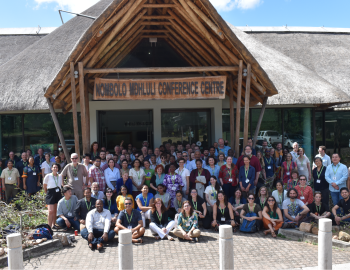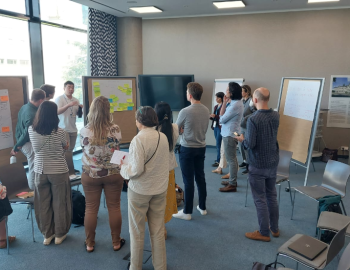Harnessing ecosystem-based adaptation to drive progress towards global targets
Harnessing ecosystem-based adaptation to drive progress towards global targets
Friends of Ecosystem-based Adaptation (FEBA), a collaborative network of over 100 organisations dedicated to advancing the awareness and uptake of ecosystem-based approaches in global adaptation and resilience efforts, has launched a pivotal report at the 16th meeting of the Conference of the Parties (COP) to the Convention on Biological Diversity (CBD).
In January 2024, FEBA established an expert working group under the guidance of the Convention on Biological Diversity (CBD) Secretariat and the Climate and Development Knowledge Network (CDKN) to work on supporting national target setting and implementation of targets 8 and 11 under the Kunming-Montreal Global Biodiversity Framework (KMGBF).
Over the last few months, the diverse group of experts developed the newly launched report by consolidating over 12 years of evidence and best practices that link biodiversity and climate change. The result provides a comprehensive guide for policymakers and practitioners.
The report aims to assist governments in implementing effective ecosystem-based adaptation (EbA) strategies, enhancing coherence across national commitments to the CBD and UNFCCC, and contributing to the overarching goals of the Rio Conventions. It highlights critical connections to the UNCCD and the Sendai Framework for Disaster Risk Reduction, emphasising the need for an integrated approach to these interconnected challenges.
The convergence of the COPs to the Rio Conventions in 2024 presents a unique opportunity for global action. As nations prepare to address urgent issues related to biodiversity and climate change, this publication serves as a crucial tool for policymakers to translate high-level commitments into actionable solutions.
Key messages from the publication:
Strong Evidence Base: Ecosystem-based adaptation is well recognised across the Rio Conventions, and nearly 15 years of evidence and practical experience are available from implementation in diverse ecosystems and across more than 50 countries. The strong evidence base for EbA makes it a straightforward choice for delivering on global commitments towards integrating climate and biodiversity action – including under KMGBF Targets 8 and 11 – for the benefit of people and nature.
Integrated approach: Ecosystem-based adaptation has demonstrated its potential for tackling the climate and biodiversity crises while delivering on the Sustainable Development Goals. The publication emphasises how Parties can leverage EbA to fulfill their national commitments. Mainstreaming EbA into national commitments, strategies and plans can help simultaneously tackle biodiversity loss, land degradation and climate change as well as make the goals for integrated climate-biodiversity action more specific, actionable, and effective.
Greater policy coherence: There is a need for greater alignment between biodiversity, climate, and land degradation strategies, facilitating efficient resource use and streamlined processes. Coordinating national commitments and targets can maximise the use of limited financial resources and strengthen the capacity of national agencies to plan in an integrated manner.
Dimensions of equity: Considering equity a key part of integrated biodiversity and climate action can help create fair and sustainable solutions for both present and future generations. It is essential to integrate equity by focusing on human rights-based approaches that address gender, land tenure rights, and other intersecting issues. This will facilitate social inclusion in ecosystem-based adaptation (EbA) and ensure that adaptation strategies are fair, effective, sustainable, and just for all generations.
Collaboration across sectors: Involving CBD focal points, scientists, national biodiversity agencies, and natural resource planners in the implementation and monitoring of ecosystem-based adaptation (EbA) is crucial for mainstreaming these approaches. Their ecological expertise can enhance the effectiveness of EbA initiatives by ensuring they are well-planned and executed. These groups must therefore collaborate from the co-design, to the implementation and monitoring of EbA activities.
Enhancing collaboration: Enabling national biodiversity and climate policy coherence will require new and strengthened collaboration across government agencies, subnational authorities, and non-state actors. It's essential to start this process now rather than waiting for a perfect solution. Policymakers should partner with practitioners and experts through networks like FEBA to leverage diverse experiences and resources. Strengthening of collaboration at all governance levels enhances the effectiveness of initiatives by involving local stakeholders in their design and implementation.



